It's a busy day for the Riot team working on Legends of Runeterra, but they've still got time to cover some details about the randomness of the game. Check it out!
Quote From Legends of Runeterra 4/28/20 01:10 PM
SETTING SAIL TO BILGEWATER
Yes Hello Hi! I’m Alexzandros “Careless Whisper” Lee, the design lead for the Rising Tides expansion. Rising Tides adds a new region—Bilgewater—and a bunch of new keywords and mechanics.
In Bilgewater, fortune favors the bold and life always comes with a little risk. We’re excited to bring that flavor to a fresh design space and introduce new kinds of cards to LoR—like this one:
Make It Rain is a card that can play out a few different ways, which is what we think makes it exciting and fun. But we’re also aware that there’s a word in the rules text fraught with a lot of potential hazards: random. So before we cover Make It Rain (and a few other fun cards from the Rising Tides set), let’s dive in and talk about how we think about randomness in Legends of Runeterra. Beware—here be jargons.
RANDOM, THE DOUBLE-EDGED SWORD
Random is a spicy word in the card game genre. Some players aren’t fans of the implied inconsistency and reliance on “luck.” Others welcome the excitement and unpredictability it brings. On the LoR team, we believe there is a way to include random elements that is fun for all types of players, and healthy for the game overall. But to show you why we think that, first we need to define two other ideas: variance and uncertainty.
We use variance to mean the range of results you might get from an action, while we refer to uncertainty as the lack of knowledge of which results you may get. Both of these together create what we colloquially call “randomness.” They are individual levers designers can use to tune a random game element, but it’s tricky to tweak one aspect without affecting the other, as high variance can cause a lot of uncertainty.
There are some elements of variance and uncertainty that exist inherently in the rules of LoR, and some that are common to the whole card game genre. For example:
- Your deck is shuffled, so what you draw is uncertain.
- Who you play against and the deck they’re playing with has high variance.
The uncertainty of what you’re going to draw is important because it helps create game-to-game variety and exciting moments each round start; the games when you get the perfect hand are much different than the games when you only get half of your combo. It pushes you to adapt and seek out other avenues to tip the game in your favor.
Designers can use these two elements as levers to create more exciting, edge-of-your-seat experiences, but we have to be careful: randomness is a double-edged sword.

Without enough, LoR would feel deterministic and flat—plays would have strictly correct choices, because you know the entire outcome beforehand. Too much randomness, on the other hand, and you can feel like you have no control over your own game—the choices you make ultimately don’t matter, because who wins is left up to chance.
At the same time, variance and uncertainty are also often the unsung heroes that help make every game feel exciting and different, no matter how many games you’ve played before. They’re the catalysts for unique strategies and exciting top-decks that let you blow out your opponent when you draw the right card, at the right time.
As with so many things, it all comes down to striking a balance. And when done right, randomness doesn’t replace skill, but actively creates new ways to showcase it.

THE ART OF ADAPTABILITY
One of the principles of LoR design is Skillful Plays Matter. Skill, in this context, is a combination of three pillars:
Planning
The ability to come up with a plan beforehand (or figure out one on the fly) in order to win a game. It can be anything from “yeti deck, smash!” to “against this opponent, I need to do X, Y, and Z to win.”
Interpretation
The ability to read a situation and make the correct play, at the correct time. These are the big brain moments: saving that Deny for the right spell, or attacking into an opponent with full mana because you already know they don’t have a response.
Adaptability
The ability to adjust to new situations, especially ones where some information is unknown. Situations like “my opponent is playing a deck I’ve never seen before,” and “I only have half my combo, how do I survive until I get the rest?”
The adaptability pillar is where randomness comes in: to deal with variance and uncertainty, you’ll need to adapt and improvise.
Earlier I mentioned that LoR already has some elements of randomness built into the game rules. They’re examples of what we would call “healthy” randomness, where you can change your tactics based on the outcome and still have a shot at success—not getting a one-drop in your aggro deck’s opening hand isn’t awesome, but it’s not an instant loss, either. This is compared to something like winning the game on a coin flip, which would be “unhealthy” randomness—there’s nothing you can do to change the outcome of what is essentially pure luck, and the entire game is riding on it, not just your first attack. We enjoy dramatic game ends (and we’re sure many of you do too); we just prefer they come from a top-deck that could be anticipated versus completely unexpected.
Even for the person favored by a random outcome, unhealthy randomness steals the skillful play from you with a feeling of “I got lucky.” It can also make it difficult for you to improve as a player if there’s not much you could have done differently.
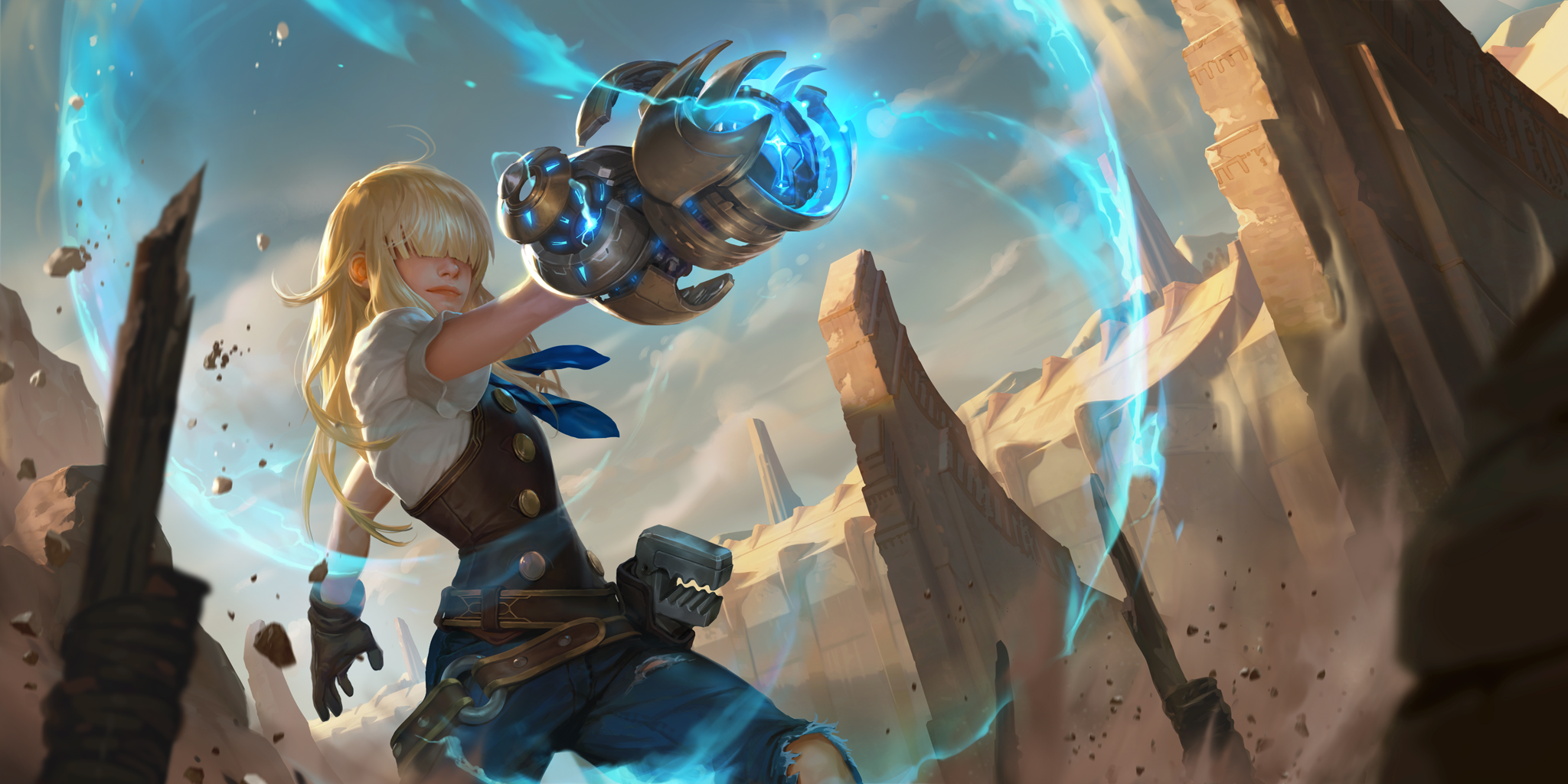
So one of the main ways we decide whether a random element is a healthy one for LoR is how much agency a player has to adapt to it: What information can you leverage and what do you control that can affect the variance and uncertainty?
Let’s revisit the fundamental randomness of card games:
- Your deck is shuffled, so what you draw is uncertain. But when you build your deck, you can control some of the variance.
- Who you play against and the deck they’re playing with has high variance, but knowing how much mana they have left and what cards they can use can reduce your uncertainty.
If there isn’t some way for a player to adapt to variance or uncertainty, then we’re less excited about putting it in the game, because it’s less exciting for you as a player.
Another way we look at whether something random is healthy involves its impact. Generally the more impact something has, the bigger outcome or effect it has on the game, and the more work we’re going to ask of a player to get the result they want. Cards like Warmother’s Call are incredible when you can pull ’em off, but it shouldn’t be too easy or too frequent.
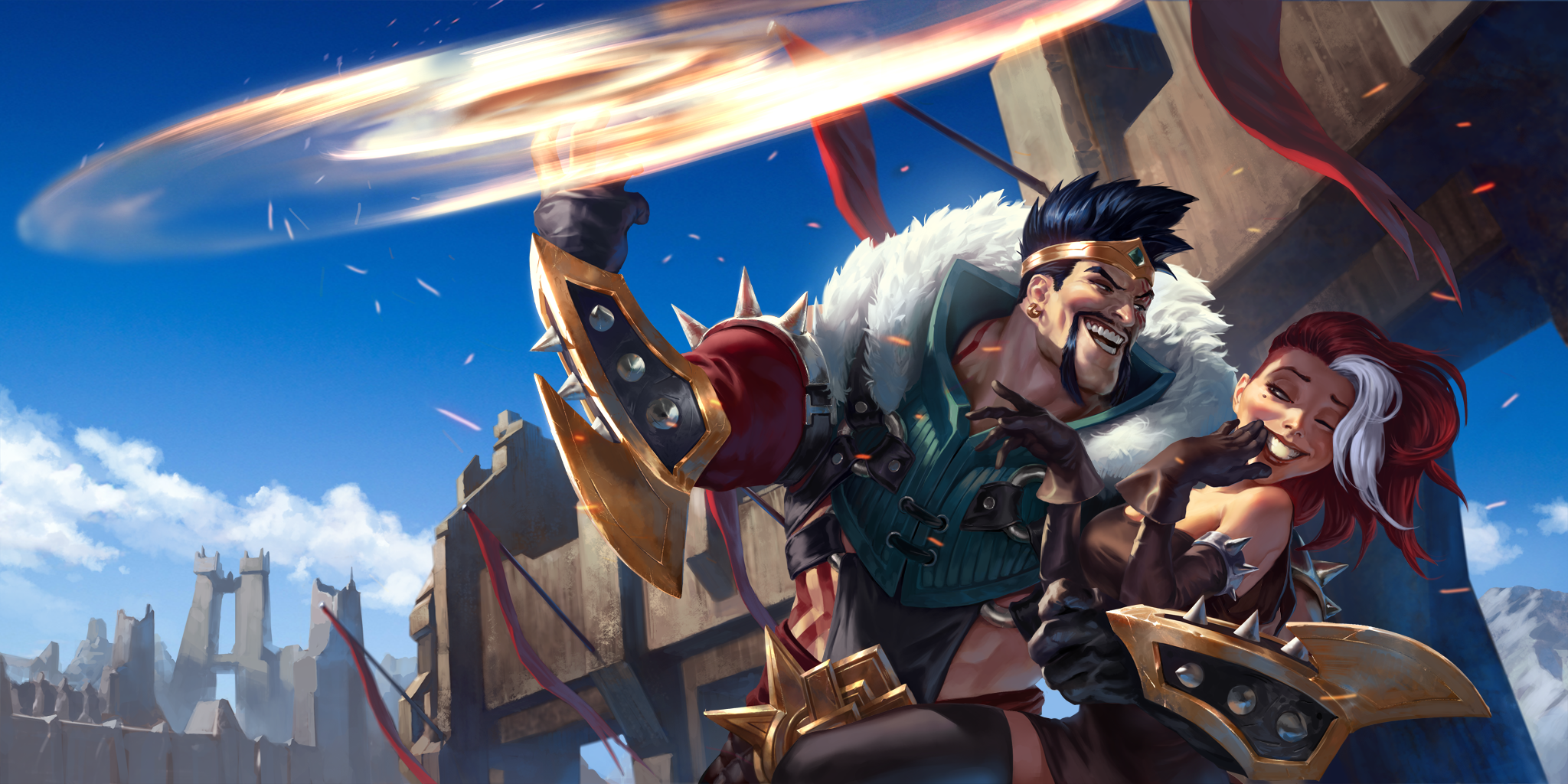
“But what about X? That card breaks these guidelines!”
It definitely might. These are guidelines we (and now you!) can use when evaluating cards, not hard and fast rules. Sometimes we’ll try to push the boundaries for cool effects, and we won’t always get it right at first (hello Elnuks!). What’s important to us is that when you run into situations where you feel you’ve hit unhealthy randomness and there isn’t a way to tip the game back into your favor, you call it out.
Now with all that in mind, let’s talk about the bets we’ve made in Rising Tides to bring what we think is healthy randomness—and the risky, roguish charm Bilgewater is known for— to LoR.
BACK TO BILGEWATER
The randomness you’ll find in Bilgewater operates on a pretty simple idea: “I’m making a bet I know I’ve already won.” It’s a region that’s unafraid to stack the deck and finesse the board to make sure a hail of bullets hits the right targets.
At first glance, it may look like Make it Rain is completely random. But we’ve used those levers of variance and uncertainty to make it more nuanced (and more healthy) than a coin flip.
First, it can’t hit the same enemy twice, meaning if your opponent has two units on the board, you’re guaranteed to hit both (and chip their Nexus, too!). You get to challenge your ability to adapt and execute to set up the board for the perfect cast of it, using Bilgewater’s removal effects to help you do so. (Alternatively, if you’re on the receiving end, you can predict it’s about to rain if your opponent focuses on getting your units to 1 health. Or if your bad knee starts aching.)
Second—and this is important—it’s only random for the player casting it. Once you commit Make it Rain, the targets are finalized and indicated. The opposing player gets to see exactly what is going to happen, and has a chance to effectively respond using that concrete information.
Let’s take a look at another card with built-in randomness:
Like Make it Rain, there are a couple reasons why we believe this card will introduce healthy randomness:
- Including this card in your deck is opting in to a playstyle that forces you to adapt a lot every game; you’ve made a choice to lean on that pillar of your skill.
- Your opponent has a good idea of what the outcome can be, because they know all the cards in their deck and what you might have stolen.
Here’s one more example that brings randomness to both your play-by-play tactics (like Make It Rain) as well as the overall style of a deck (like Pilfered Goods):
Our buddy Zap is an awesome example of the sort of variance and uncertainty we like to have in LoR:
- It rewards you for constructing your deck in a way that lets you control the variance, and therefore the uncertainty.
- Your opponent is rewarded for their knowledge of the different regions you’re playing, because the more awareness they have of all cards in that cost range, the better they can predict what you might have drawn.
DIVE IN
The true test of whether we’ve struck the right balance of randomness is how it feels to play, so we’re excited to see what you all think now that the cards are out in the wild. You can discover the rest of the Rising Tides set and the Bilgewater region right now (on both PC and mobile, by the way!) and try your hand at making randomness work for you.
We hope you enjoyed this design dive; let us know what you think of it and if you’d like to see more in the future! Until then, may you always find fortune’s favor.


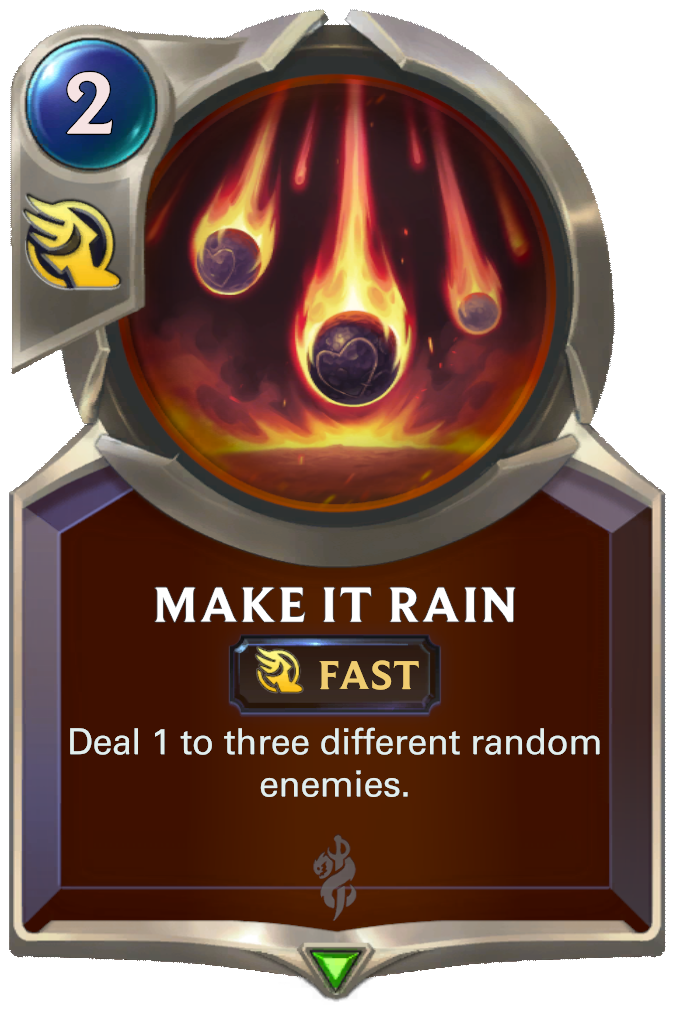

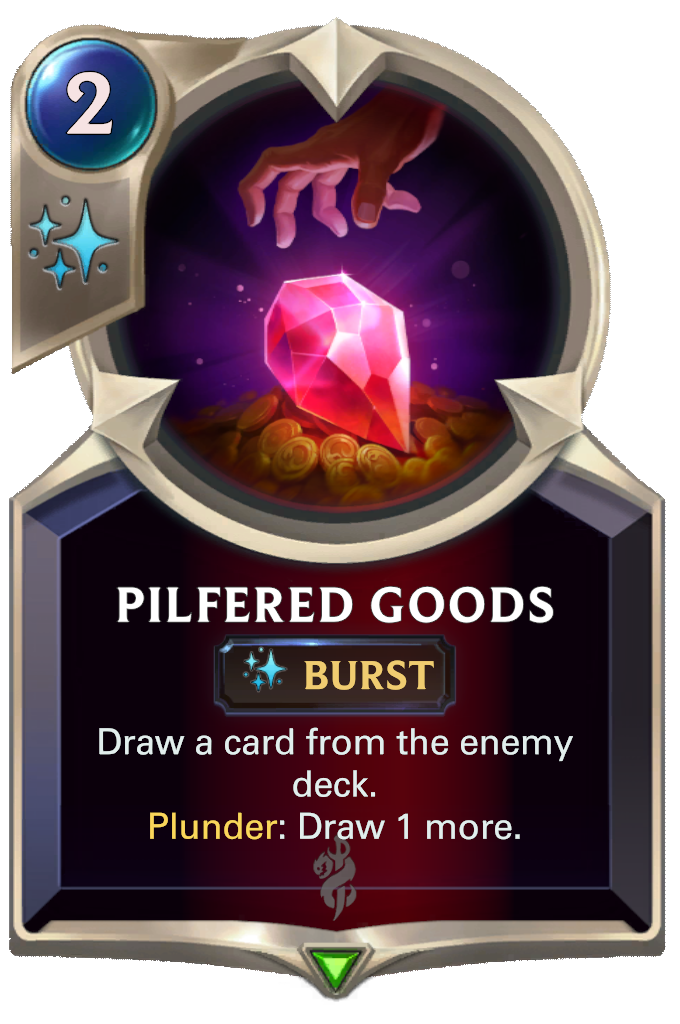
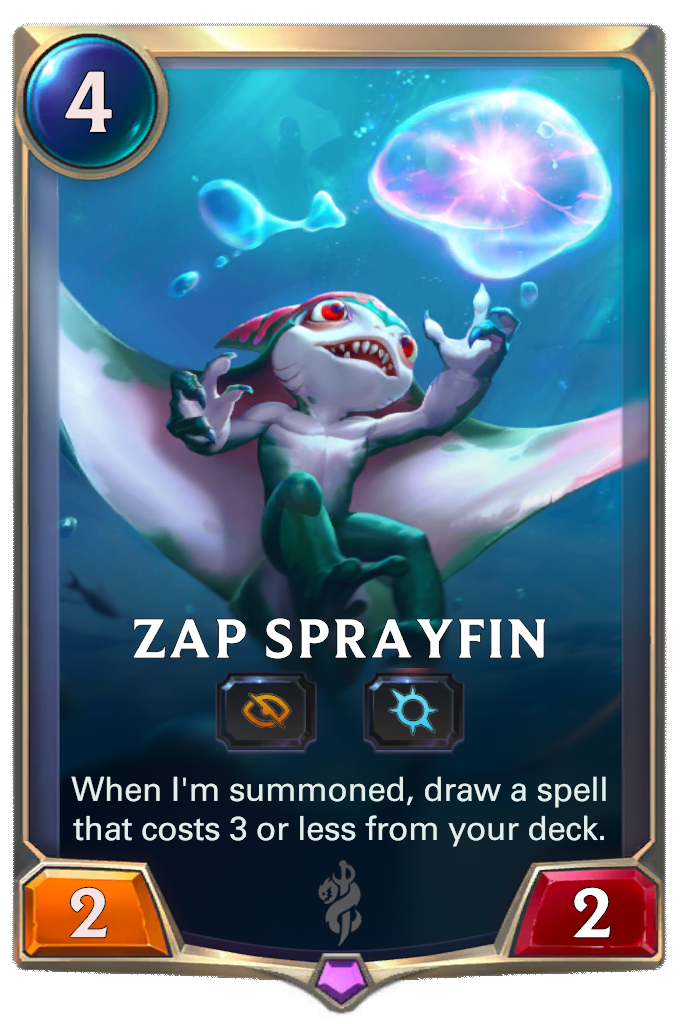



Comments
Excelent post to read for any player of any card game in general. Im into custom card creation of Hearthstone and LoR from the release of both games, and with the take of various game in my life i created several games, mostly card games, so this is so interesting for my future projects.
Excelente posteo para leer para cualquier jugador de cualquier juego de cartas en general. Estoy metido en la creación de cartas fan-made de Hearthstone y Legends of Runaterra y con mi experiencia e inspiración en varios juegos en general que he jugado en mi vida, he creado varios juegos de mi autoria, mayormente juegos de cartas, por eso esta lectura es tan interesante para mi y mis futuros proyectos!
Greetings from Argentina!
Great article! Even if you don't play LoR it is still a very interesting article about a very interesting topic in card games.
Nice read.